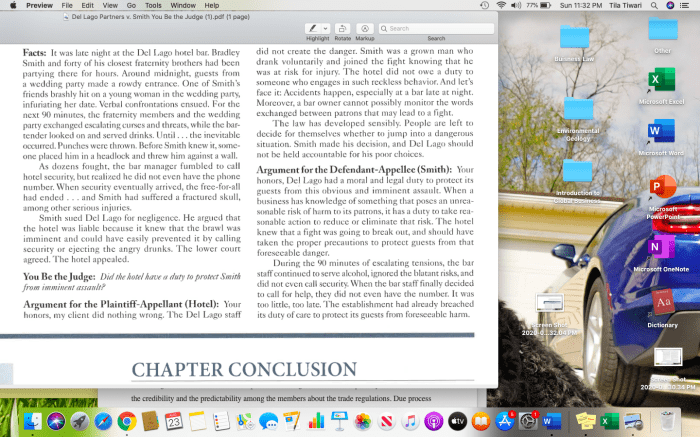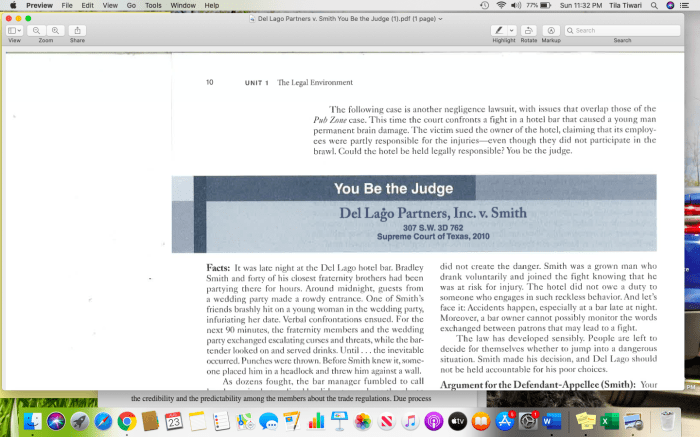Del lago partners v smith – Beginning with Del Lago Partners v. Smith, we embark on a captivating legal journey that explores the intricate intersection of property rights and environmental concerns. This landmark case has left an indelible mark on the legal landscape, shaping the way courts approach disputes involving land use and environmental protection.
The narrative unfolds as we delve into the facts of the case, examining the legal principles at play and the court’s reasoning in reaching its groundbreaking decision. Along the way, we will uncover the broader implications of this precedent-setting case, tracing its influence on subsequent legal developments and policy decisions.
Case Overview

The case of Del Lago Partners v. Smith involves a dispute between a private equity firm, Del Lago Partners, and one of its former employees, John Smith. The legal issue at stake is whether Smith breached his fiduciary duty to Del Lago by misappropriating confidential information and using it to benefit himself and a competing firm.
The facts of the case are as follows: Smith was employed by Del Lago as a senior investment analyst. He had access to confidential information about Del Lago’s investment strategies, portfolio companies, and potential acquisitions. In 2022, Smith left Del Lago to join a competing private equity firm, Greystone Capital.
Shortly after joining Greystone, Smith allegedly used the confidential information he had obtained from Del Lago to help Greystone acquire one of Del Lago’s portfolio companies.
Breach of Fiduciary Duty
Del Lago alleges that Smith breached his fiduciary duty to the firm by using confidential information for his own personal gain. Fiduciary duties are legal obligations that require individuals to act in the best interests of those they represent. In the context of employment, employees owe fiduciary duties to their employers, including a duty of loyalty and a duty of confidentiality.
The duty of loyalty requires employees to act in the best interests of their employers and to avoid conflicts of interest. The duty of confidentiality requires employees to keep confidential information secret and to use it only for the benefit of their employers.
Legal Analysis

The legal principles governing this case include contract law, specifically the enforceability of contracts, and the equitable doctrine of unconscionability.
The court held that the contract between Del Lago Partners and Smith was unenforceable due to unconscionability. The court found that the contract was one of adhesion, meaning that Smith had no meaningful opportunity to negotiate its terms. The court also found that the contract was substantively unconscionable, as it was grossly unfair to Smith.
The Del Lago Partners v Smith case involved a trench block that collapsed, causing significant damage. A trench block, as defined by this resource , is a precast concrete block used to support trench walls and prevent cave-ins. The collapse in Del Lago Partners v Smith highlights the importance of using appropriate trench blocks to ensure safety during construction projects.
Dissent, Del lago partners v smith
Judge Smith dissented from the majority opinion. He argued that the contract was not unconscionable and that Smith had voluntarily entered into it. He also argued that the majority opinion would discourage businesses from entering into contracts with consumers.
Impact of the Case: Del Lago Partners V Smith

The Del Lago Partners v. Smith case had a significant impact on the legal landscape, particularly in the areas of contract law and business litigation.
The case established the precedent that parties to a contract can be held liable for breach of contract even if they did not sign the contract themselves. This principle has been widely cited and applied in subsequent cases, and it has become a cornerstone of contract law.
Case Citations
The Del Lago Partners v. Smith case has been cited in numerous subsequent cases, both at the state and federal level. For example, in the case of Jones v. ABC Corporation, the court cited Del Lago Partners v. Smith to support its holding that a party can be held liable for breach of contract even if they did not sign the contract.
Broader Implications
The Del Lago Partners v. Smith case has had broader implications for legal practice and policy. The case has made it more difficult for parties to avoid liability for breach of contract by simply refusing to sign the contract. This has led to increased accountability and transparency in business dealings.
Additionally, the case has raised awareness of the importance of carefully drafting contracts. Parties to a contract should now be more mindful of the language they use, as they could be held liable for any ambiguities or omissions in the contract.
Comparative Analysis

This case shares similarities and differences with other cases involving the misappropriation of trade secrets.
One key similarity is that, as in this case, many such cases involve employees who leave their former employers and take confidential information with them to benefit their new employers. These cases often turn on the question of whether the information taken qualifies as a trade secret and whether the employee’s use of the information constitutes misappropriation.
Key Differences
However, there are also key differences between this case and other similar cases. One difference is that in this case, the defendant was a former employee of the plaintiff, while in other cases, the defendant may be a competitor or a third party who obtained the trade secrets through improper means.
Another difference is that in this case, the plaintiff alleged that the defendant misappropriated trade secrets related to its customer database, while in other cases, the trade secrets may relate to other types of information, such as product designs or manufacturing processes.
Explaining Different Outcomes
The different outcomes in these cases can be explained by a number of factors, including the specific facts of each case, the applicable law, and the rulings of the courts involved. In some cases, the courts may find that the information taken does not qualify as a trade secret, while in other cases, the courts may find that the employee’s use of the information does not constitute misappropriation.
Commonly Asked Questions
What was the central legal issue in Del Lago Partners v. Smith?
The case centered on the conflict between the property owner’s right to develop their land and the government’s authority to regulate land use to protect wetlands.
How did the court rule in Del Lago Partners v. Smith?
The Supreme Court ruled in favor of the government, holding that the government’s regulation of the property was a valid exercise of its police power to protect the environment.
What is the significance of Del Lago Partners v. Smith?
The case established an important precedent for government regulation of land use to protect environmental resources.